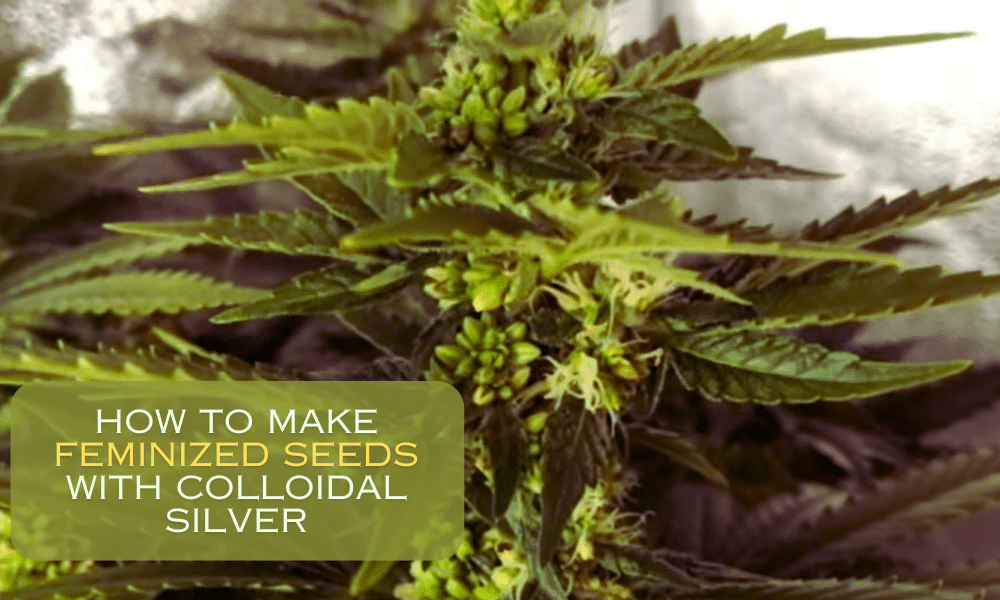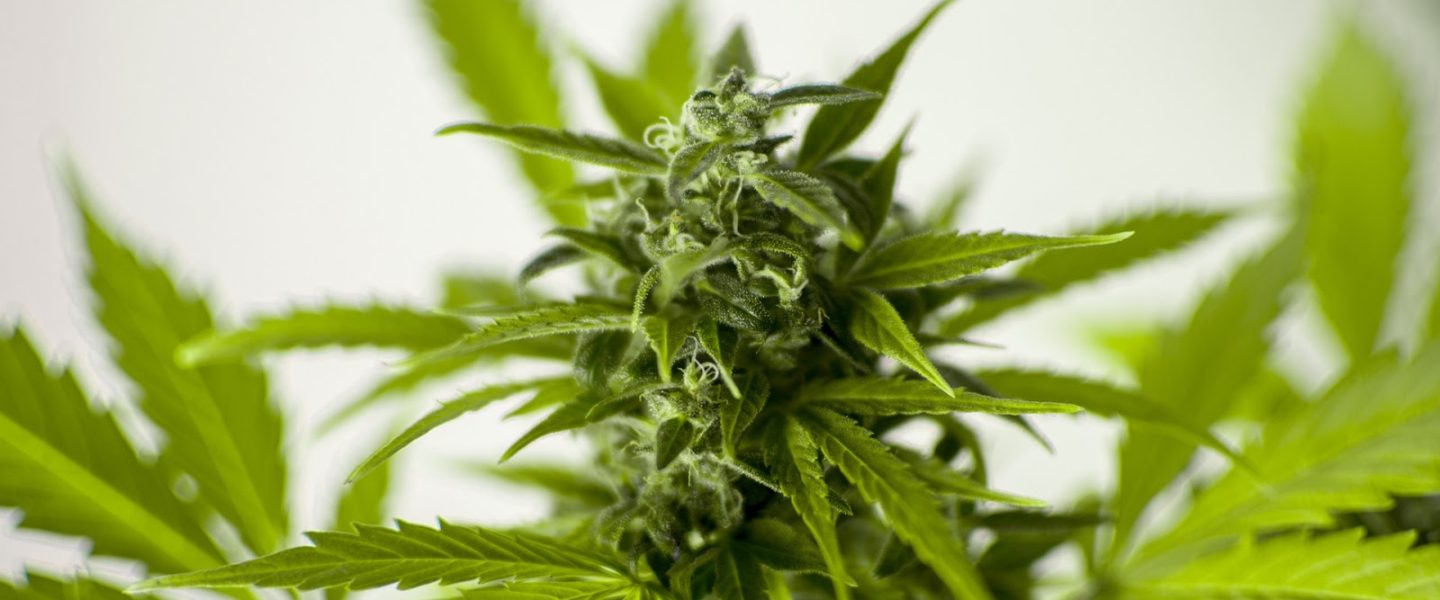No products in the cart.
Marijuana Education
How to feminize seeds with colloidal silver
It’s a widely known fact that female plants can produce seeds without males, a process known as parthenogenesis. This biological phenomenon serves as the foundation for the production of feminized seeds, a popular choice among growers seeking consistent and reliable yields of female plants.
When it comes to feminizing cannabis seeds, using colloidal silver solution is the most popular option for commercial cultivators and home growers. But it’s not a simple process, involving metal, electricity, and chemical reactions. In this blog, we’ll explain exactly how to feminize cannabis seeds with colloidal silver, step by step.
Understanding the feminization process
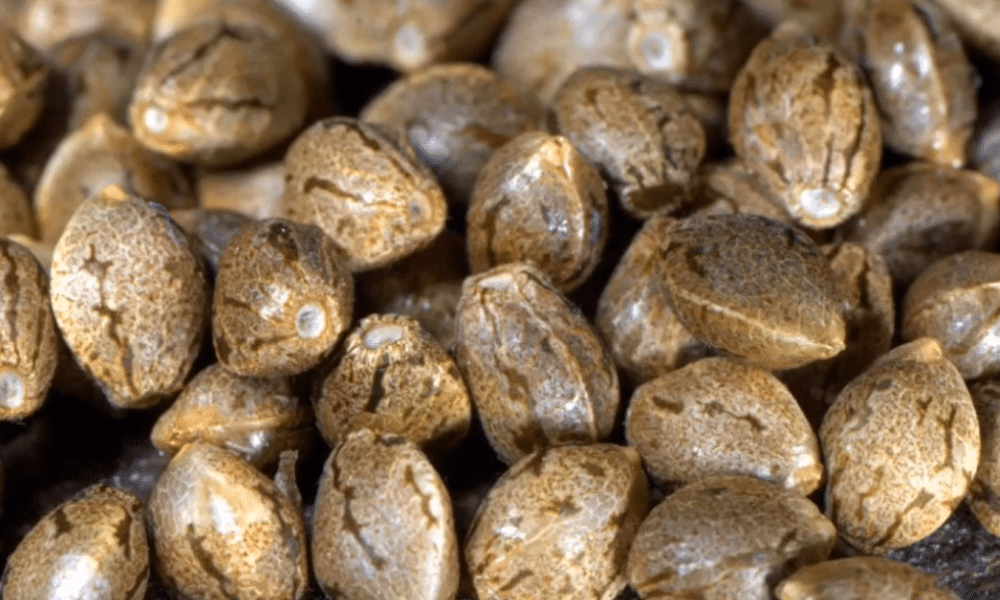
What is a feminized seed? A seed that has been bred specifically to grow female plants.
Creating feminized seeds is a process that allows a female plant to begin flowering before applying enough stress to cause the plant to self-pollinate. This results in the female plant producing entirely female seeds so you don’t have to try to tell the difference between male and female weed plants.
There are a few tried-and-true methods for how to make feminized seeds, each with its own pros and cons:
- Colloidal silver
- Silver thiosulfate
- Aspirin
- Gibberellic acid
- Rodelization
Colloidal silver for plants is an excellent method for feminizing seeds because it has a high success rate.
However, according to a survey conducted by The Seed Fair, which gathered responses from 500 individuals, it was found that only a relatively small segment of respondents, approximately 14%, had experimented with the colloidal silver method for producing feminized seeds.
| Total | Yes | No | Total | Yes | No | |
| Total | 501 | 74 | 427 | 501 | 14.77% | 85.23% |
| Gender | ||||||
| Female | 306 | 36 | 270 | 306 | 11.76% | 88.24% |
| Male | 195 | 38 | 157 | 195 | 19.49% | 80.51% |
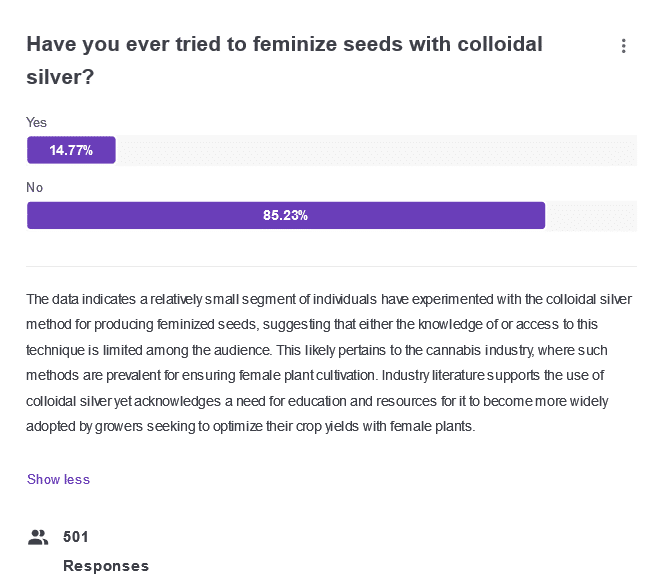
What is Colloidal Silver and How it Works
Colloidal silver is a water-based silver solution that has microscopic pieces of silver suspended in it.
The solution is sprayed 1 – 3 times a day on a sexually mature female plant (ideally 1-3 days before flowering) to induce the growth of pollen sacks. These sacks will create female seeds in any plant they pollinate.
Colloidal silver spray for plants can feminize seeds because silver suppresses ethylene production. Ethylene is a hormone that is necessary for female sex expression in plants. By repeatedly spraying colloidal silver for cannabis plants, you’re encouraging the production of male sex expression, namely pollen sacks.
The colloidal silver spray for plants must be made with pure silver and distilled water to create the most potent solution. Silver content is measured in parts per million; to feminize seeds, your colloidal silver solution must be between 15 ppm and 30 ppm. Anything below 15 ppm is too weak to be effective.
How to get colloidal silver for feminizing seeds
You have a few options for getting colloidal silver, based on how much effort you want to put in.
| Amount of Effort | Options |
| Most effort |
|
|
|
|
|
| Easiest/ least effort |
|
Most people who feminize their own seeds prefer to buy a silver generator and ready-to-apply colloidal silver to make the process easier, according to our survey.
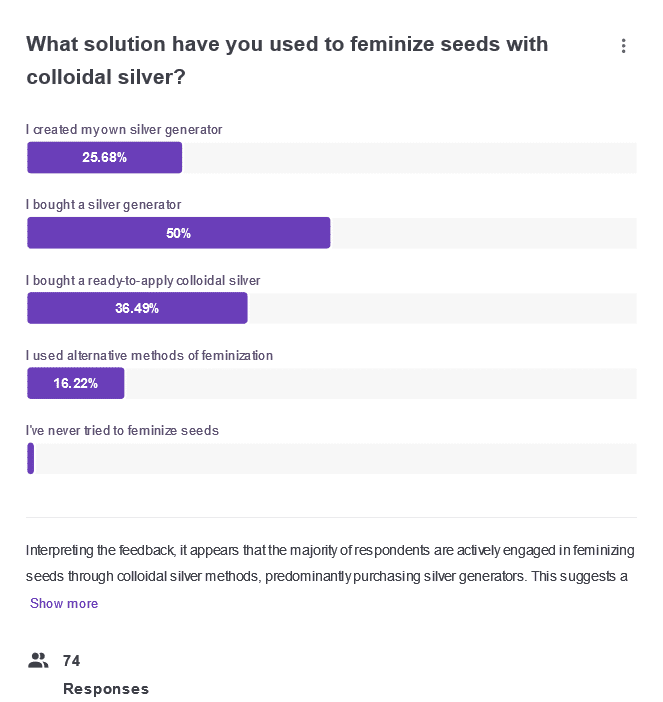
Preparation and Application
To make a colloidal silver solution, you need a colloidal silver generator. This machine uses electricity to immerse microscopic silver pieces into pure water. You can buy a colloidal silver generator online, which simplifies the process greatly. However, these machines can be expensive, and you can also make your own.
What you need to make colloidal silver
- Pure silver – at least 99%, but 99.999% is best
- Distilled water. Do NOT use tap water
- 2 lengths of electrical wire
- Wire stripper
- 9-volt battery OR 9 – 12 volt power adapter
- Small alligator clips
- PPM meter
- Glass jar
- Solder (optional)
How to make colloidal silver with a DIY colloidal silver generator
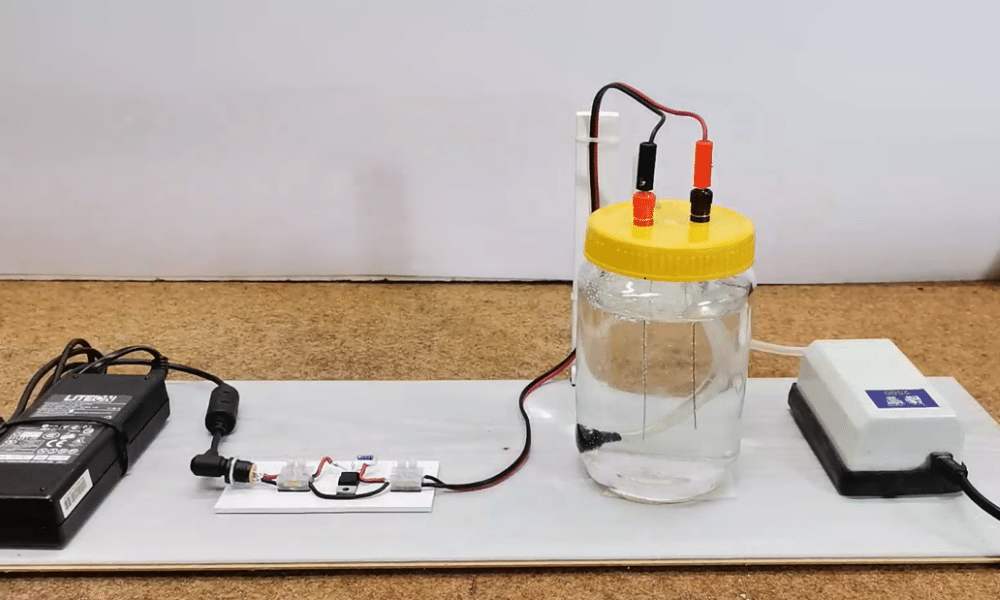
- Strip the ends of both lengths of wire and securely connect the alligator clips to one end of each. You can solder the clips to the wire if you wish.
- Affix the wires to the unplugged power adapter. Place one on positive (red) and one on negative (black)
- Fill your glass jar ¾ full with the distilled water. This is where your solution will be when the process is done.
- Place a piece of silver inside each alligator clip. Suspend these clips in the water on opposite sides.
- Plug in the power adapter and turn on. Let it run for at least 20 minutes, but you can let it run up to 10 – 12 hours for a more potent solution. The solutions will be a pale gold color.
- Unplug the adapter and remove the alligator clips.
- Test your solution with the PPM meter. It needs to be at least 15 ppm and not above 30 ppm.
- Move the solution from the glass jar into an airtight bottle, preferably dark-tinted glass. Store it in a cool, temperature-stable place away from light.
- Clean your silver and store it for next time.
How to make feminized seeds with colloidal silver
Wait until your plant has begun to flower to ensure it’s a female. You can only feminize female plants: this process does not work on male plants.
- Once flowering has begun, you can begin to spray the plant with your colloidal silver solution.
- Spray the plant at least once a day, soaking it well. You can spray the plant up to 3 times a day once it’s started to flower.
- Spray the plant daily until visible pollen sacks begin to form. This typically takes around 14 days, although some growers report seeing results in as little as 5 days.
Do NOT consume any plants you’ve sprayed with colloidal silver solution. Once sprayed, a plant will absorb the silver, making it dangerous to smoke or use in edibles. Only spray plants with colloidal silver for feminizing seeds – not harvesting or smoking.
Useful Tips
For the highest success rate feminizing seeds with colloidal silver:
- Use pure distilled water
- Use pure silver (99.99% silver, less than 1% trace elements)
- Give the electrolysis process enough time to work. Some people leave it overnight
- Store your colloidal silver solution in a dark, temperature-stable place. Don’t allow it to come into contact with light unless you’re spraying your plants.
- Mist your plant with your colloidal silver solution every day from the day it begins to flower until you see pollen sacks forming. Don’t skip a day!
While colloidal silver for feminized seeds has close to a 100% success rate, it involves an at-home chemistry experiment with heavy metals and electricity. If you’re looking for a more natural way to feminize seeds, consider rodelization.
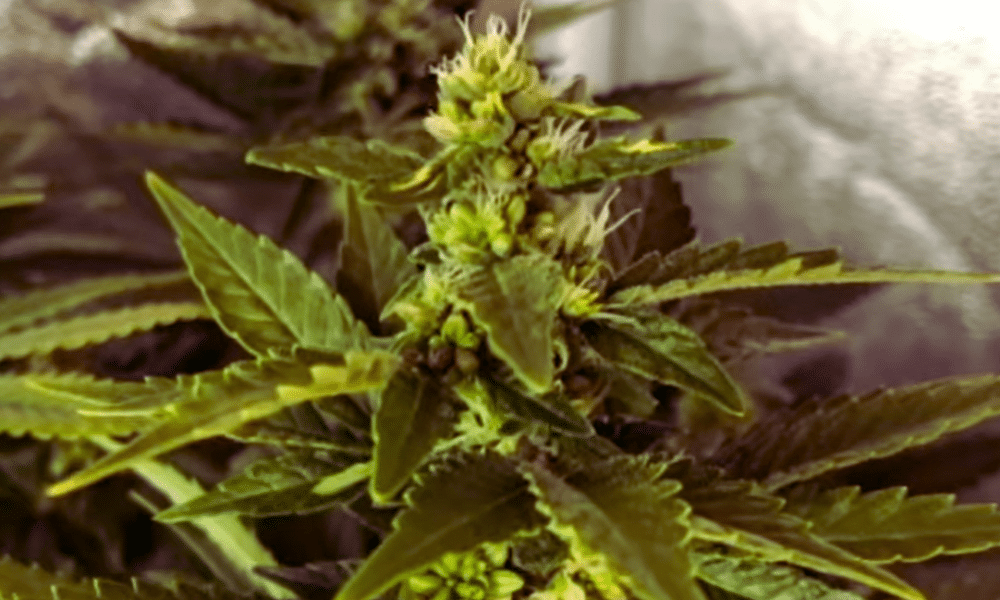
Colloidal silver is often marketed as a health supplement. While the FDA does not recognize it as effective for treating disease, many people claim anecdotal health benefits. There is a side effect from consuming too much silver which can permanently discolor your skin.
Some cannabis growers spray colloidal silver on the leaves or low branches of cannabis plants in the vegetative phase to combat insect infestation, bacteria, and fungus growth.
Do not smoke plants that have been sprayed with colloidal silver! It is dangerous to inhale into your lungs and may pose serious health risks.
Troubleshooting
We surveyed 74 individuals who have used colloidal silver for feminizing seeds to inquire about the difficulties they encountered in this process. Here are the most interesting responses.
| Gender | Age range | Region | Q: What challenges have you faced; if any; when attempting to create feminized seeds using colloidal silver? |
| Male | 30 | US | Sometimes it takes longer than 24 hours for the seed to sprout |
| Male | 33 | US | Getting the silver |
| Male | 39 | US | Getting seeds to pop |
| Male | 17 | US | Making sure the animals don’t eat it |
| Female | 20 | US | The right kind |
| Male | 51 | US | Working great |
| Male | 55 | US | They need more silver to grow |
| Male | 22 | US | I feel like it takes a lot of time to grow them. |
| Female | 25 | US | Not effective or barely notice a difference |
| Male | 28 | US | I faced challenges like weather when attempting to creatе feminized seeds using colloidal silver. |
| Male | 38 | US | Very tough to work with |
| Female | 28 | US | I have not faced any |
| Female | 32 | US | I just feel that the silver keeps everything thriving when I do the colloidal silver |
| Female | 62 | US | I had a problem getting to them grow to full-term |
| Female | 34 | US | Weather issue |
| Female | 25 | US | Money and research |
| Male | 56 | US | Just the application itself |
| Male | 48 | US | I didn’t know how to use it |
| Female | 58 | US | Really trying to learn the process; I didn’t really know what I was doing until I had a friend who was familiar with the process; show me |
| Male | 31 | US | They weren’t growing and I wasn’t sure why |
| Male | 38 | US | Trial and error. |
| Male | 27 | US | Not consistent and reliable |
| Male | 22 | US | Weather and soil erosion |
| Male | 38 | US | Many brands to pick the best of them |
| Female | 40 | US | It was a lot of work I guess after you do it for a while you get the hang of it it was very challenging and I couldn’t get the growth out of it. I wanted to. |
Conclusion
Colloidal silver solution is a popular method for feminizing plants. You can make colloidal silver at home using a colloidal silver generator, but it is a time-consuming process to make and apply. The easiest way to make feminized seeds is to buy them from a trusted seed bank.
FAQ section
Silver Thiosulfate Solution or colloidal silver: which one is the best?
Both colloidal silver and silver thiosulfate work well for feminzing seeds. Colloidal silver has a more intensive application schedule while silver thiosulfate requires mixing silver nitrate, which is toxic in high quantities. Decide which you’re more comfortable with.
What are the side effects of feminizing seeds with colloidal silver?
You cannot smoke any plants that you spray with colloidal silver.
Can I apply colloidal silver to autoflowering plants?
Yes, you can feminize autoflower plants with colloidal silver solution.However, there is an issue with these plants. Ideally, the colloidal silver solution should be applied during the early vegetative stage, typically around 1 to 2 days before the anticipated flowering stage begins. Applying it at this stage maximizes the chances of inducing the production of male flowers containing pollen while avoiding the risk of missing the window of opportunity. With autoflowering plants, pinpointing the exact moment they transition from vegetative growth to flowering can indeed be challenging.


